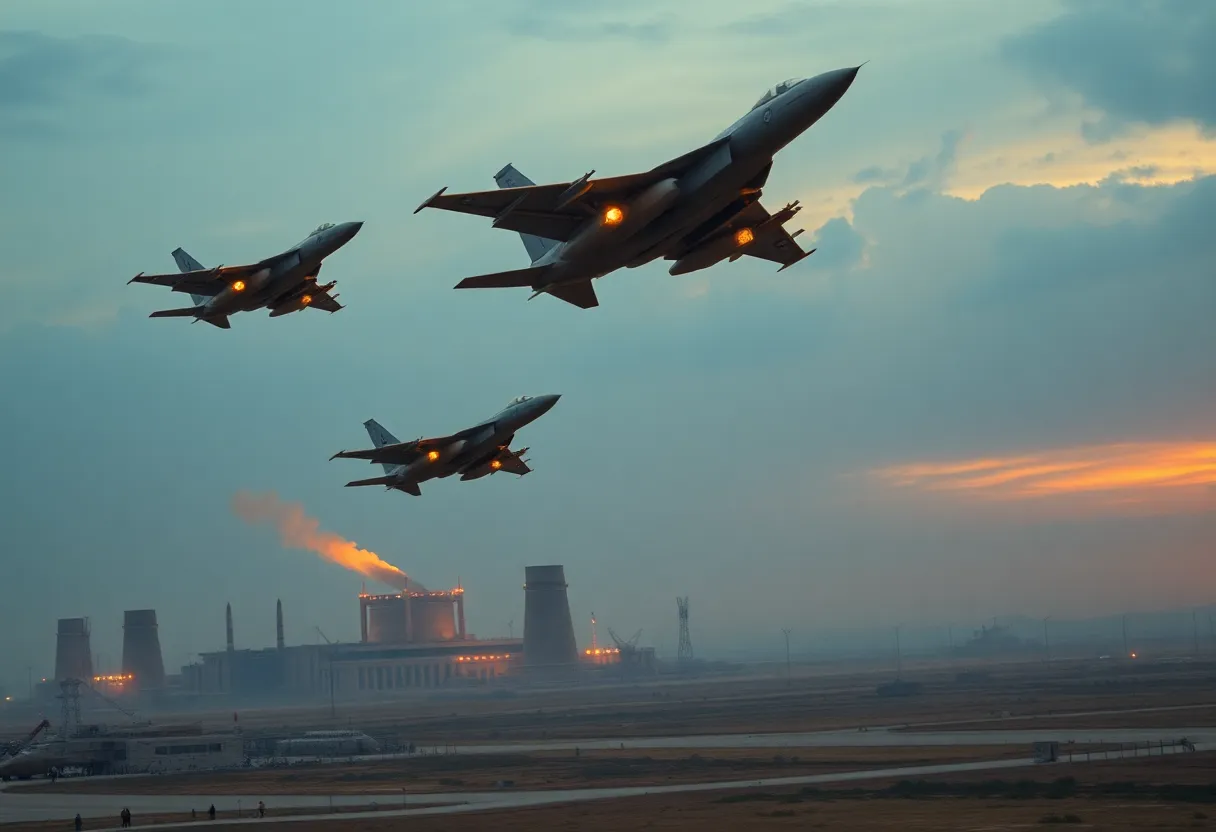

A visual representation of the escalating military conflict between Israel and Iran over nuclear facilities.
Israel has initiated a significant military operation against Iran, targeting its nuclear facilities to disrupt its alleged weaponization program. This attack has sparked fierce retaliation from Iran, escalating existing tensions between the two nations. Reports indicate that Iranian casualties include several scientists, and the situation has heightened fears of a wider regional conflict. As both nations ramp up their military capabilities, global leaders are increasingly concerned about the implications for security and stability in the region.
In a dramatic turn of events, **Israel launched a large-scale military attack** on Iran’s nuclear facilities on June 13, 2025. The initiative, announced by **Israeli Prime Minister Benjamin Netanyahu**, aims to disrupt what he claims is Iran’s nuclear weaponization program. However, the **US intelligence community** contradicted these assertions, stating that Iran’s nuclear program is currently *non-weaponized*, raising questions about the motivations behind Israel’s actions.
Iran has long maintained that its nuclear ambitions are strictly for **peaceful energy purposes**. Over the decades, the country has developed its nuclear capabilities, viewing them as a source of **national pride and sovereignty**. Notably, the **uranium necessary for nuclear reactors** is relatively scarce, and the UN watchdog has stated that Iran possesses a unique stockpile of uranium without a corresponding weapons program found in other nations.
Interestingly, Iran has leveraged its stockpile of weapons-grade uranium in diplomatic negotiations regarding US-led sanctions. They’ve even expressed *willingness to dispose of this stockpile* if those sanctions are lifted. This complicated backdrop dates back to the 1950s when Israel first engaged with Iran’s nuclear program, seeking collaboration under the pro-Western Shah. However, after the 1979 Islamic Revolution, support from the US waned significantly.
As a result of the recent Israeli attacks, **at least six Iranian scientists** reportedly lost their lives, along with significant damage inflicted on an aboveground enrichment plant at the **Natanz facility**. This bold move doesn’t come without repercussions. **Iran has stepped up its uranium enrichment levels**, hitting an alarming 83.7% purity, which is dangerously close to being *weapons-grade*. Undoubtedly, these developments have heightened the stakes on both sides.
In retaliation, Iran has launched missile strikes against Israel, leading to casualties and escalating tensions even further. Major Israeli cities have already experienced mass injuries due to these retaliatory actions, prompting an increase in **security measures** across the nation.
Amid escalating hostilities, Iranian Supreme Leader **Ayatollah Ali Khamenei** has vowed retaliation, deeming the Israeli strikes as a “declaration of war.” Both nations have reported casualties and damages, further muddying the waters of this fraught relationship. Iran’s air defense systems have responded vigorously, and the back-and-forth strikes indicate a **new level** of conflict that could have ramifications far beyond the immediate region.
As the situation heats up, concerns have been raised about the potential involvement of the **US** and other international actors. The rising tensions, along with existing military alliances, pose a threat that **could escalate into a wider conflict**. Global leaders are echoing these concerns, worried that ongoing hostilities might lead to a more significant regional or even global conflict.
The current landscape of increasing **nuclear capacities** and military strategies from both nations has alarmed observers around the world. With reports emerging that the **UN watchdog** has classified leaked materials from Iranian nuclear sites as having manageable contamination levels, this gives little comfort considering the *intensity of military engagements*. The risks for civilian populations nearby are mounting, prompting serious safety and humanitarian considerations.
As both Israel and Iran gear up for continued conflict, each side seems prepared for an escalation that could last weeks or even months. The unfolding events are a stark reminder of the complexities and dangers of the region’s nuclear narratives and military postures. With a rapidly changing landscape, it’s important to keep an eye on this situation as it develops.
News Summary Health officials in Fulton County have confirmed that mosquitoes have tested positive for…
News Summary An 83-year-old woman in Forest Park, Georgia, was left without air conditioning for…
News Summary At the SEC Media Days, Alabama's head coach Kalen DeBoer and standout players…
News Summary Atlanta is remembering its first Black fire chief, William H. Hamer, who passed…
News Summary A significant theft occurred in Atlanta when unreleased music from superstar Beyoncé was…
News Summary Atlanta is hosting the SEC College Football Media Days, where key teams like…